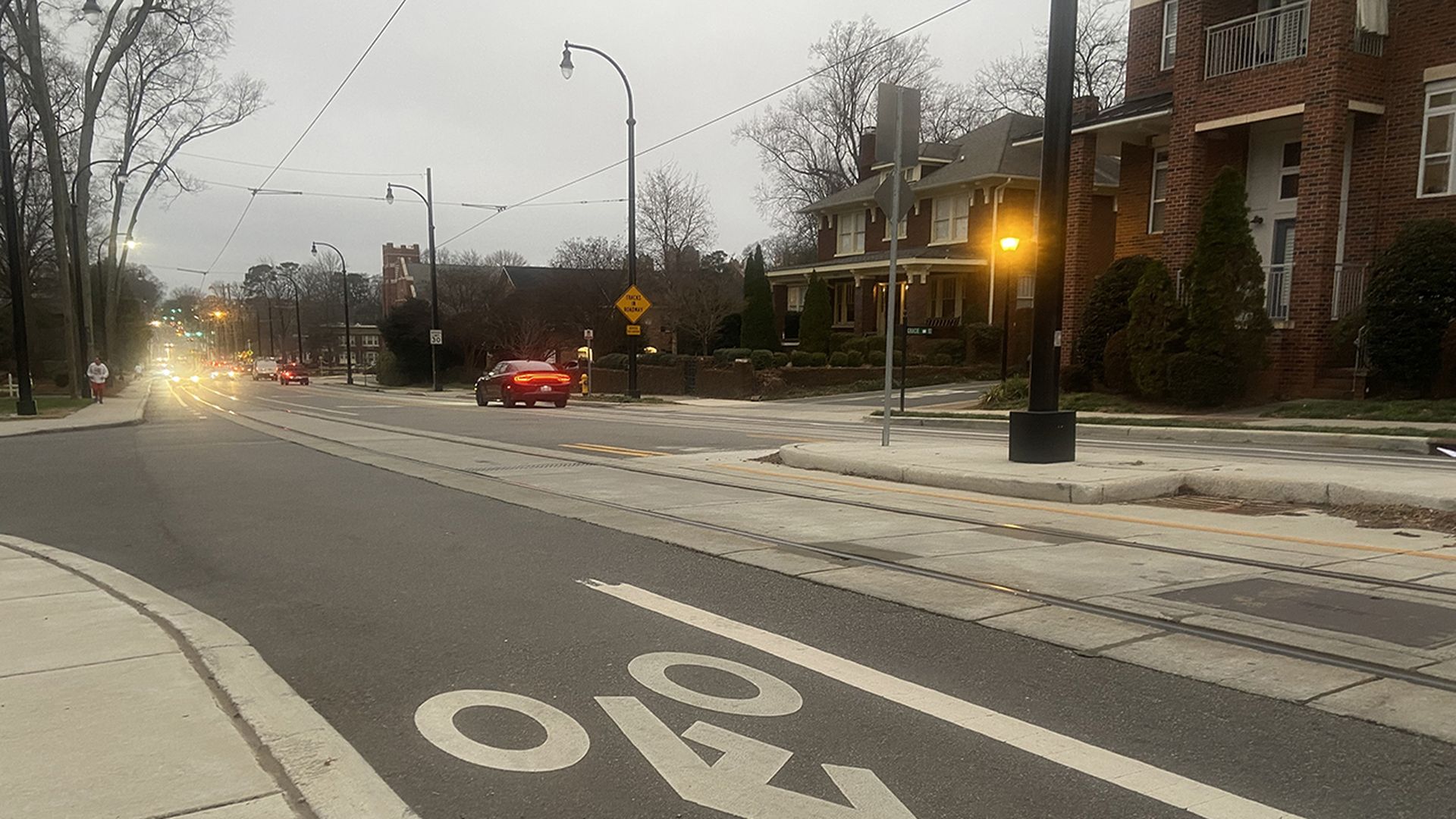
Photo: Alexandria Sands/Axios
As Charlotte endured a tragic week for traffic safety, one of the state’s most powerful lawmakers condemned the city’s plans to become less car-dependent.
What’s happening: Last week, a bicyclist crashed into a Honda as she was traveling from a residential street onto The Plaza, according to CMPD’s initial investigation. Kristie Crowder, 30, was taken to the hospital and pronounced dead the following afternoon.
- On Tuesday, a woman was hit by a car, also on The Plaza, and died. Police said the woman was waving a knife, and had backed into the street as officers confronted her.
- Also this week, detectives charged a driver who was allegedly using her phone when she struck and killed a pedestrian on Brookshire Boulevard in late November.
On Monday, N.C. House Speaker Tim Moore visited Charlotte for an event, alongside Senate leader Phil Berger, and criticized the city’s transportation plan, which promotes alternative modes to cars, like biking, rail and buses. Moore said Charlotte should be focused on road infrastructure — and that it shouldn’t try to change people’s habits.
Why it matters: The House Speaker’s opposition adds another hurdle to the city’s lofty transportation goals.
- Charlotte needs a one-cent sales tax increase to help fund its $13.5-billion transit plan. But the state legislature would have to allow a sales tax referendum to be put on a ballot for residents to vote on.
- Moore told reporters the current transportation plans focus too much on buses, at a time when ridership is down, and bike lanes, when the majority of people drive a car to get around.
“It wasn’t a surprise to me that they think that,” said Ed Driggs, a city council member and chair of the city’s transportation committee. “I guess I was a little surprised that they were so blunt in the news conference.”
- It was the most one of the two legislative leaders had ever publicly weighed in on the plan.
WFAE reporter Steve Harrison transcribed Moore’s comments on Twitter:
The other side: Sustain Charlotte director Shannon Binns says a convenient transit system and walking and biking network is the best solution to reduce emissions and bridge inequities, since everyone cannot afford to own a car.
- “Residents across our region have said they want more transit for longer trips and opportunities to walk and bike for shorter trips. This plan is a response to what local residents have said they want,” Binns adds.
Of note: Moore did not respond to Axios’ request for comment.
Zoom out: Also this week, Charlotte Area Transit System braced for a potential bus driver strike. The local bus drivers union and management have repeatedly failed to reach an agreement over work terms. A strike could leave 18,000 people, largely low-income and minority residents, without a way to get to work or other necessary destinations.
State of play: Charlotte’s transportation plan has already faced several headwinds. Residents from Mecklenburg County’s other municipalities have questioned how much they would get out of passing a sales tax.
- Driggs wants to organize the other communities’ leaders and collaborate on Connect Beyond, a regional transportation framework that Charlotte’s plan fits into.
- According to the Connect Beyond plan, 96% of survey respondents in Mecklenburg, Union and Iredell counties said they would prefer high-capacity transit over driving.
- “We need to get the infrastructure for the partnership in place before we can really engage with the legislature or respond to their concerns,” Driggs said.
Zoom in: Another concern of Moore’s was the city’s lack of focus on expanding roads. But Charlotte doesn’t have much land left to work with.
- Plus, studies show widening roads does not relieve traffic congestion and in some cases makes it worse.
“You can never widen or build enough roads to accommodate a car for every person,” Binns says. “There are just too many people and too little space.”
Driggs says they’ll need to familiarize lawmakers with Charlotte’s constraints when it comes to widening streets. (Moore represents parts of Cleveland and Rutherford counties.)
- The council member points to Providence Road as an example of a road that’s crowded yet impractical to widen.
The big picture: The House Speaker’s strong reaction to the plan underscores Charlotte’s long road ahead in achieving its transportation goals.
- Even worse, the statements were made at an event hosted by Charlotte Regional Business Alliance, which supports the transit plan.
- In 2021, a coalition of the CLT Alliance spent around $120,000 paying three consultants to seek approval from state lawmakers for the sales tax.
“The Charlotte Regional Business Alliance believes investments in transportation and infrastructure will be key to the region’s long-term competitiveness, success, and quality of life for all. Our support and advocacy for greater investment in all modes of transportation will continue,” Joe Bost, the alliance’s SVP of government affairs, said in a statement to Axios.
What’s next: It remains to be seen when a referendum could end up on an election ballot, but at the earliest, Driggs predicts it would be next year.
- While it’s possible the legislature’s input could lead to changes to the transportation plan, Driggs says walkability, bike lanes and alternatives to cars remain a priority for city council.
- “We’re trying to get all of the people that need to participate, including ultimately the public, to a point of consensus,” Driggs said. “And it just feels to me like we’ve got a lot of work left to do.”

Get more local stories in your inbox with Axios Charlotte.
More Charlotte stories
No stories could be found

Get a free daily digest of the most important news in your backyard with Axios Charlotte.
